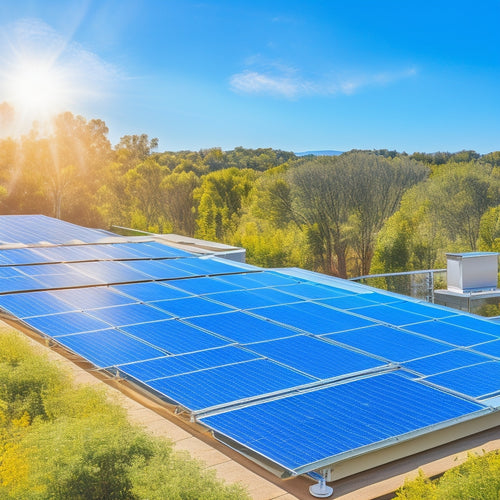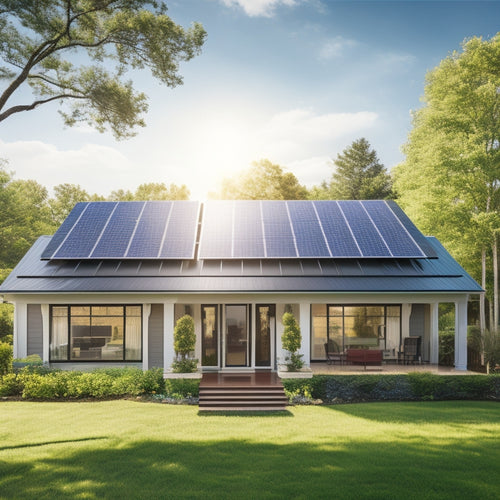
Top-Rated Home Solar Power Kits for Achieving Energy Independence
Share
Top-rated home solar power kits enable you to achieve energy independence by greatly cutting your energy costs. You can save between $400 to $1,000 annually, with total savings accumulating to $10,000 or more over the system's lifetime. These kits typically include high-efficiency solar panels and efficient inverters, designed for maximum output. Additionally, financial incentives like a 30% federal tax credit can enhance your return. By analyzing your energy usage patterns, you can optimize the system's performance further. Exploring these key aspects will show you how to effectively utilize solar power for your home.
At a Glance
- High-efficiency solar panels with 300-400 watt ratings maximize energy generation potential, essential for achieving energy independence.
- Comprehensive solar kits include inverters and battery banks, ensuring effective energy conversion and storage for off-grid power supply.
- Significant long-term savings of $10,000 to $30,000 over the system's lifespan enhance economic viability and independence from utility costs.
- Federal and state financial incentives, like the 30% tax credit, reduce upfront installation costs and improve return on investment.
- Regular maintenance, including panel cleaning and performance inspections, optimizes system efficiency and prolongs longevity for sustainable energy use.
Cost-Effective Energy Solution
When you consider home solar power kits, you're looking at significant long-term savings on your energy bills.
Studies show that homeowners can save thousands over the lifespan of their solar systems, especially when combined with available government incentives.
Additionally, solar panels can reduce energy costs by 50-75%, leading to annual savings ranging from $400 to $1,000.
These financial benefits make solar energy not just a green choice, but a smart economic decision for your household, further enhanced by financial incentives that lower installation costs.
Long-Term Savings Potential
Investing in home solar power kits can yield significant long-term savings, converting your energy expenses into a more predictable and manageable budget line. By making a solar investment, you're not just reducing your monthly utility bills; you're setting the stage for financial independence.
Studies indicate that homeowners can save between $10,000 and $30,000 over the lifespan of their solar systems, depending on energy usage and local electricity rates.
When you consider the rising cost of electricity, the savings potential becomes even clearer. A well-executed solar installation can generate enough energy to cover your needs, effectively insulating you from future rate hikes.
This means you can allocate funds that would've gone to energy bills toward other priorities—be it retirement, travel, or personal projects.
Moreover, financial planning becomes simpler. With solar energy, you can anticipate your energy costs, making it easier to budget and invest elsewhere.
The upfront costs might seem intimidating, but the long-term return on your solar investment can be substantial, enhancing your financial freedom and providing peace of mind as you gain control over your energy production.
Government Incentives Available
Government incentives for solar energy can considerably reduce your initial investment, making it a more cost-effective solution for homeowners. One of the most significant incentives available is the federal tax credit, which allows you to deduct a substantial percentage of your solar installation costs from your federal taxes. As of 2023, this credit stands at 30%, translating into significant savings for those looking to adopt solar technology.
In addition to federal incentives, many states offer rebates that can further decrease your costs. These state rebates vary widely but can often cover a portion of your installation expenses, making solar power even more accessible.
For instance, states like California and New York have strong programs that streamline the rebate process, allowing you to realize savings quickly.
Combining these federal tax credits and state rebates can significantly enhance your return on investment, allowing you to achieve energy independence sooner. By taking advantage of these incentives, you not only reduce your financial burden but also contribute to a more sustainable future.
If you're considering solar power, now's the time to investigate these beneficial incentives that enable your freedom from rising energy costs.
Eco-Friendly Energy Production
When you opt for solar energy, you greatly reduce your carbon footprint while utilizing a renewable resource.
Additionally, financial incentives such as tax credits and rebates can make solar installations more accessible and affordable.
Studies show that residential solar installations can lower greenhouse gas emissions by up to 80% compared to traditional energy sources.
This shift not only benefits the environment but also positions you as a proactive participant in the fight against climate change.
Benefits of Solar Energy
Solar energy stands out as a revolutionary solution for eco-friendly energy production, offering numerous benefits that extend beyond mere electricity generation. By utilizing the power of the sun, you can greatly reduce your reliance on traditional energy sources, enabling you to take control of your energy needs.
Recent solar technology advancements have made solar panels more efficient and affordable, making residential solar adoption increasingly viable for homeowners like you.
One of the most persuasive reasons to evaluate solar energy is its potential for cost savings. Once you install a solar system, you can lower or even eliminate your electricity bills, which means more financial freedom for you.
Additionally, many states offer incentives and rebates for homeowners who invest in solar, further enhancing your savings.
Moreover, solar energy can increase the value of your home. Studies indicate properties with solar installations sell for more than those without.
This investment not only benefits you in the short term but also pays dividends in the long run. By embracing solar energy, you're contributing to a sustainable future while enjoying the benefits of energy independence.
Reducing Carbon Footprint
A considerable advantage of utilizing solar energy is its profound ability to reduce your carbon footprint. By utilizing renewable resources, you can considerably lower greenhouse gas emissions compared to traditional fossil fuels. In fact, switching to solar power can cut your household's carbon emissions by up to 80%, depending on your energy consumption and local grid emissions.
When you adopt solar energy, you're not just enhancing your energy independence; you're also engaging in sustainable practices that promote environmental health. Each kilowatt-hour of solar energy you produce means less reliance on coal and natural gas, which are major contributors to climate change. According to the U.S. Department of Energy, solar energy helped avoid over 100 million metric tons of carbon dioxide emissions in 2020 alone.
Moreover, by investing in home solar power kits, you're taking a proactive step toward a cleaner future. The shift to solar enables you to generate your own energy and contributes to a collective effort to mitigate climate change.
As you welcome this eco-friendly energy production method, you'll enjoy both personal freedom and a healthier planet for generations to come.
System Specifications Overview
When evaluating home solar power kits, it's vital to understand the key component features and their impact on overall performance.
Essential components, such as high-efficiency inverters and properly sized battery banks, play a significant role in optimizing energy production and storage.
You'll want to examine the power output capacity, as this directly influences how much energy your system can generate.
Analyzing these specifications will help you make an informed decision customized to your energy needs, ensuring that you achieve efficient battery bank design that balances storage and longevity.
Key Component Features
Understanding the essential features of home solar power kits is important for making informed decisions about your energy needs. When you evaluate these kits, focus on key components like solar panels, inverters, and battery storage.
High-efficiency solar panels convert sunlight into electricity effectively, while inverters are significant for changing that electricity into a usable form for your home.
The installation process should be straightforward, ideally requiring minimal skill. Many kits come with pre-assembled components and clear instructions, but you may want to think about professional installation for ideal performance.
Maintenance requirements can vary, but most systems need little upkeep. Regular cleaning of the panels and occasional inspections can keep your system running efficiently.
Look for kits that offer long warranties, as this indicates manufacturer confidence in their products, providing peace of mind as you work toward energy independence.
Power Output Capacity
Power output capacity is an important factor in determining the effectiveness of your home solar power system. To achieve true energy independence, you need a system that meets your household energy demands. The capacity is measured in watts, and it reflects how much energy your solar panels can generate under ideal conditions.
Higher solar panel efficiency translates to more energy produced from a smaller surface area, which is vital if roof space is limited.
When evaluating solar power kits, look for systems with panels rated between 300 to 400 watts each, as these generally offer the best balance of efficiency and output.
Additionally, consider energy storage options, like lithium-ion batteries, which allow you to store excess energy generated during the day for use at night or during cloudy periods. A well-matched battery system can enhance your overall energy independence and reduce reliance on the grid.
Evaluate Your Energy Consumption
To effectively evaluate your energy consumption, start by analyzing your daily usage patterns.
Conducting an energy audit can provide important understandings into your household's energy habits and highlight areas for potential savings.
Track how much energy you consume throughout the day and identify peak times when your demand is highest.
This data will help you tailor your solar power kit to meet your specific needs and optimize energy savings.
Assess Daily Usage
How can you effectively evaluate your energy consumption to maximize the benefits of a home solar power kit? Start by conducting thorough energy monitoring. This involves tracking your electricity usage over a specific period, ideally a month, to understand your daily patterns.
Use smart meters or energy monitoring devices that provide real-time data, helping you identify which appliances consume the most energy.
Next, analyze your usage patterns. Look for trends throughout the day and week; for instance, you may notice higher usage during evenings when lights and electronics are in full swing. Understanding these patterns allows you to strategize better—whether by adjusting your habits or scheduling heavy-use appliances during daylight hours when your solar kit generates the most energy.
Consider creating a simple spreadsheet to log your daily usage data. This can help you visualize spikes in consumption and pinpoint areas for improvement.
Ultimately, by evaluating your daily energy usage and making informed adjustments, you'll not only increase your energy independence but also reduce your reliance on the grid—bringing you closer to the freedom that solar power can provide.
Identify Peak Times
While monitoring your energy usage, identifying peak times is essential for maximizing the efficiency of your home solar power kit. Understanding when your household consumes the most energy allows you to align your solar production with your consumption. Generally, solar peak hours occur when sunlight is most intense, typically between 10 AM and 3 PM. During these hours, your solar panels generate the most energy, making it the perfect time to use appliances that draw considerable power.
Start by analyzing your energy bills to identify patterns in usage. You might find that cooking dinner or running air conditioning coincides with higher energy consumption. By shifting these activities to coincide with solar peak hours, you can greatly reduce reliance on the grid, thereby enhancing your energy independence.
Additionally, consider investing in smart home technology that can automate your energy usage based on solar production. This strategic approach not only maximizes the efficiency of your system but also enables you to take control of your energy future.
Ultimately, knowing your peak times can help you utilize the full potential of your solar power kit, leading to greater savings and independence.
Higher Long-Term Savings Potential
By installing a home solar power kit, you can considerably reduce your energy bills over time.
Data shows that homeowners who switch to solar can save thousands on their electricity costs, especially as utility rates rise.
These long-term savings not only make financial sense but also enhance your home's value.
Reduced Energy Bills
Investing in home solar power kits can notably reduce your energy bills, leading to higher long-term savings. By utilizing solar energy, you can produce your own electricity, considerably cutting down on monthly utility costs. In fact, many homeowners report savings of 50% or more on their energy bills after switching to solar.
Smart technology enhances this efficiency further. With energy monitoring systems, you can track your energy consumption in real-time, allowing you to adjust usage patterns to maximize savings. This data-driven approach allows you to see exactly how much energy your solar panels generate, and how much you're using, giving you the ability to make informed decisions.
Additionally, as energy prices continue to rise, investing in solar means locking in lower costs for the long term. Over 20-25 years, the savings can accumulate to tens of thousands of dollars, providing you with financial freedom.
Plus, with potential tax credits and incentives, the initial investment becomes even more attractive. Ultimately, embracing solar power not only helps you save money, but it also frees you from fluctuating energy prices and dependence on traditional energy sources.
Frequently Asked Questions
How Do Solar Kits Affect Home Insurance Premiums?
Installing a solar kit can lower your home insurance premiums, as it enhances property value and energy efficiency. Insurance coverage often reflects these solar kit benefits, potentially leading to discounts and increased financial freedom for homeowners.
Are There Any Tax Incentives for Installing Solar Power Kits?
When you install solar panels, you could benefit from federal incentives like the Investment Tax Credit, which allows you to deduct a percentage of installation costs. Additionally, many states offer rebates, further enhancing your savings and energy independence.
Can I Take My Solar Kit When I Move?
You can take your solar kit when moving, but consider the moving logistics. Portable solar systems are easier to transport, while larger installations may require professional help. Assess your needs and plan accordingly for a smooth shift.
What Maintenance Is Required for Home Solar Power Kits?
Maintaining your solar power kit involves regular solar panel cleaning to remove debris and optimize efficiency. Also, check your inverter for proper functioning; it's essential for converting solar energy into usable electricity. Don't neglect these tasks!
How Long Does Installation Typically Take for Solar Kits?
Installation timelines for solar kits usually range from one to three days, depending on your location and site conditions. However, challenges like weather or permitting can extend this period, so plan accordingly for potential delays.
Explore More
In conclusion, investing in a top-rated home solar power kit not only promotes eco-friendly energy production but also offers a cost-effective solution for your energy needs. By evaluating your energy consumption, you can tailor a system that maximizes savings and efficiency. Isn't it time you took control of your energy future? With the potential for significant long-term savings, moving to solar power could be the key to achieving true energy independence for your household.
Related Posts
-

How to Achieve a Zero-Waste Lifestyle for a Greener Tomorrow
To achieve a zero-waste lifestyle, start by adopting the principles of refusing, reducing, reusing, and recycling. Sw...
-

What Types of Solar Energy Devices Are Available
You'll find several types of solar energy devices available today, each customized to different energy needs. Photovo...
-

Home Solar Installation Cost
You're considering installing solar panels on your home, and the upfront cost is likely the biggest hurdle standing i...


